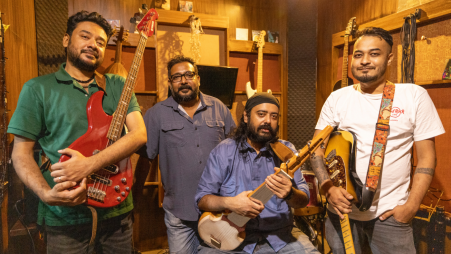Labik Kamal Gaurob: Crafting a folk odyssey with the LKG Quartet
LKG Quartet’s Labik Kamal Gaurob talks about their unique approach to cater to both local and international audiences

Labik Kamal Gaurob, the frontman of the recently formed LKG Quartet, embarked on his musical journey in his childhood, delving into classical music. His first decade was devoted to training in instruments like Tabla, Sitar, and honing his voice.
The subsequent ten years saw him perfecting his skills, particularly exploring folk music with his former band Ajob, delving deep into Lalon Shai's compositions. Now, after over two decades in music, and in the third phase of his career, Labik aims to do some soul searching through music. Inspired by legends like Bob Marley and Bob Dylan, he envisions himself transforming into an artist, from a mere musician, in the years to come.
This is where the LKG Quartet comes into play. The four-piece band is helmed by musician and composer Labik, Ahnaf Khan Anik on guitar, Farshid Alam on bass and Adnan Rushdi on drums. The band's official journey began with a funk rendition of the legendary Sachin Dev Burman's 'Shoite Pari' in early October as a tribute to the musical maestro's month of birth and death, which is now available on their official Facebook page 'The LKG Quartet.'
"I've formed this band after 40 years of life, it's no joke! Every member has huge musical experience. But the band isn't limited to four people. It's called a quartet, yes, but for our other songs, other musicians come together," Labik said.
The LKG Quartet are currently working on some originals and covers, including SD Burman, Lalon Fakir, Kobi Jalal, just to name a few. A Lalon Fakir tribute is in the works, as we speak.
"We're beginning with covers so that the wider audience can have a taste of what our band will sound like in the future and what kind of music to expect. We have live shows planned for November through January," Labik added.
Labik, Anik, Farshid, and Rusdhi, seasoned musicians and longtime friends, didn't have to premeditate the formation of the band. Their camaraderie, cultivated over years at 'StudioLKG,' naturally led to the band's formation. Rushdi, former drummer for Bangla V, later joined them. The studio served as a musical haven, as well as a "chill spot," where spontaneous jam sessions made the four realise the undeniable musical chemistry they had.
"One day, as I was on the Dotara, Anik and Farshid on their instruments, we jammed randomly. The chemistry we shared in those 20 minutes convinced us to take this musical journey seriously," said Labik.
The LKG Quartet are not your average pop culture band catering to the mainstream. They have a niche they want to serve. "We want to crack a sweet spot among our own audience and that should be it," Labik said.
In commercial terms, the band focuses on lucrative corporate shows, adapting to the digital era where rampant piracy has affected musicians significantly. The decline of recording labels and traditional media brings new challenges for revenue generation. To address this, the quartet prioritises corporate live shows for financial stability while exploring artistic ventures through music ensembles.
Additionally, they engage in creating musical scores and jingles for documentaries and advertisements. Labik's composition 'Premer Manush,' available on YouTube, offers a glimpse of the band's collective ensemble, featuring members from Coke Studio Bangla (CSB).
Jannatul Firdous Akbar, known for her backing vocals in numerous CSB songs, along with saxophonists Rahin Haider and Sayonton Mangsang frequently featured in CSB songs, are part of the ensemble, among other CSB members. The connection arises as Labik has been a significant figure in the Bangladeshi music scene and a member of CSB. Naturally, his ensemble includes familiar faces from CSB, and his collaborations extend to musicians like Shayan Chowdhury Arnob and Faizan Rashid Ahmad (Buno), maintaining long lasting friendships.
Maybe in a later season of CSB we will experience Labik's bard-like voice with which he covers a heart-warming Lalon Fakir song.
"We're all essentially the same circuit, or fraternity, if you will," Labik said.
As a band, their aim is not only to make music for the 'Bangali ear.' They plan to travel with their music in the near future and in their tours, they would not like to go just as performers to Bangladeshi expatriates. Instead, they are attempting to compose music that satisfies an international standard, while also keeping the very Bangali soul of their music alive.
"To a foreigner, all our deep and meaningful lyrics mean nothing; they only want the music. If the music alone pleases them, we're good to go. It's our goal to take our music to the world and make them acknowledge its beauty," Labik said in the end.



 Keep updated, follow The Business Standard's Google news channel
Keep updated, follow The Business Standard's Google news channel
















